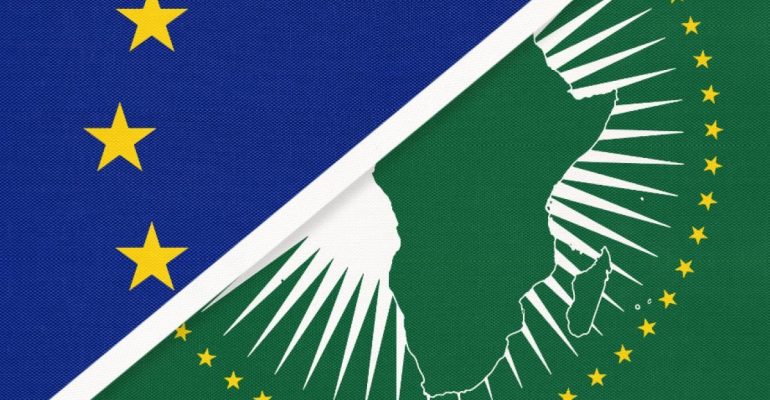Bridging Continents Through Trade

Bridging Continents Through Trade
The Flourishing Euro-African Agri-Food Partnership
For centuries, Europe and Africa have shared a dynamic trading relationship rooted in geography, history, and mutual economic interests. In recent years, this partnership has evolved into a powerhouse of opportunity, particularly in the agrifood sector. By 2023, for instance, total trade between the EU and Africa surged to an impressive €400 billion, marking a 25% increase from a decade prior. While minerals, energy, and manufactured goods remain staples of this exchange, it’s the story of African agri-products that is capturing global attention—and reshaping the future of Euro-African trade. Let’s explore how agriculture is driving this transformation and how initiatives like EuroAfri Link are crucial in this progress.
The Agri-Food Boom: Africa’s Green Gold in European Markets
Africa’s agricultural sector has long been the backbone of its economies, but today, it is emerging as a strategic player in global food security. Europe, with its more than 450 million consumers and growing demand for diverse, sustainable, and ethically sourced products, has become a critical destination for African agri-exports. From the aromatic coffee beans of Ethiopia to the nutrient-rich avocados of Kenya and the organic cocoa of Ghana, African produce is increasingly gracing European supermarket shelves, restaurants, and households.
Key Agri-Exports Driving Growth
Fruits & Vegetables: Kenya’s avocado exports to the EU grew by 33% in 2023, while Morocco’s citrus fruits and Senegal’s mangoes are thriving in European markets.
Coffee & Cocoa: Africa supplies over 70% of the world’s cocoa, with Ivory Coast and Ghana dominating production. Europe, home to chocolate giants like Belgium and Switzerland, relies heavily on these exports.
Grains & Pulses: Ethiopia’s teff and Nigeria’s sesame seeds are gaining traction as health-conscious European consumers seek gluten-free and protein-rich alternatives.
Sustainable Oils: Cold-pressed oils from Tanzania’s sunflower farms and Northern Uganda and South Sudan nilotica shea butter are prized in Europe’s cosmetics and food industries.
This surge isn’t accidental. It reflects Africa’s agricultural modernization, supported by EU investments in sustainable farming practices, infrastructure, and trade agreements. For instance, the EU- Kenya Economic Partnership Agreement (2023) slashed tariffs on Kenyan avocados, blueberries, and green beans, boosting exports by 40% in its first year.
The Engine Behind the Growth: Strategic Partnerships
While Africa’s agricultural potential is undeniable, unlocking it requires more than fertile soil. Challenges like fragmented supply chains, limited access to financing, and compliance with EU’s stringent quality standards have historically hindered smallholder farmers. Enter EuroAfri Link, an organization that facilitates trade between both continents, thereby bridging these gaps through EU tech transfer, EU market access training, and partnerships.
How EuroAfri Link is Transforming Agri-Trade
Digital Marketplaces: EuroAfri Link, with its online platform, connects African farmers directly with European buyers and ensures fair pricing. For example, Malawi ginger growers now negotiate contracts with Dutch buyers in real time.
Certification Support: The EU’s “Farm to Fork” strategy demands strict sustainability and safety standards. EuroAfri Link provides training and resources to assist African producers to understand compliance, enabling market access. Also collaboration with certification body for African farmers willing to venture into internatioanl market one of EAL’s top prorities.
Logistics Solutions: Through partnerships with logistics organisations, EuroAfri Link will be able to reduce post-harvest losses by optimizing cold storage and shipping routes, especially for perishable goods. This enables exporters to achieve about 95% on-time delivery to EU ports.
Financial Access: EAL works with third-person financiers to assist African farmers with funds and insurance, especially when expanding their business.
“Our goal at EAL is to turn African’s ‘potential’ into ‘prosperity, ’ and when African farmers can sell directly to buyers in the EU, that is how mutual benefits in trade is built.
Economic Impact: Beyond Revenue to Resilience
The ripple effects of agri-trade growth are profound. For Africa, it means job creation, rural development, and reduced dependency on volatile mineral markets. In Kenya for example, the avocado boom has lifted over 500,000 smallholders out of poverty. For Europe, it ensures a stable supply of affordable, high-quality fresh produce while advancing sustainability goals.
Critically, this trade is reshaping narratives. Instead of the outdated donor-recipient dynamic, Euro-African relations are increasingly partnership-and collaboration driven. The EU’s €1.8 billion investment in African agri-tech startups (2021–2027) underscores this shift, fostering innovations like solar-powered irrigation in Niger and AI-driven pest control in Uganda.
The Road Ahead: Agri-Trade a Catalyst for a Green Future
Looking to 2030, the potential is staggering. The EU’s demand for organic food is projected to grow by 12% annually, while Africa’s arable land-60% of the global total – remains underutilized. Key opportunities include:
Climate – Smart Agriculture: Drought-resistant crops like Ethiopia’s enset (false banana) could revolutionize food security.
Renewable Energy Integration: Solar dryers and biogas systems can reduce post-harvest losses while cutting carbon footprints.
Value Addition: Africa currently exports 80% of its cocoa as raw beans. Support can be given to Ghanaian startups, for example, in this sector for niche EU markets.
Seeding a Shared Future
The story of Euro-African agri-trade is one of resilience, innovation, collaboration and mutual benefit. As climate change and geopolitical shifts redefine global supply chains, this partnership offers a blueprint for inclusive growth. EuroAfri Link is not just a facilitator—they are architects of a future where trade transcends transactions to become a force for sustainability and shared prosperity.
For businesses, the message is clear: Africa’s farms are fertile ground for opportunity. For policymakers, collaboration is key. And for consumers? Every bite of African chocolate or sip of Ethiopian coffee is a taste of partnership in progress.
Together, Europe and Africa aren’t just trading goods—they’re cultivating a brighter future and building bridges.
Author
Patience Chindong: Co-Founder and CEO at EuroAfri Link

